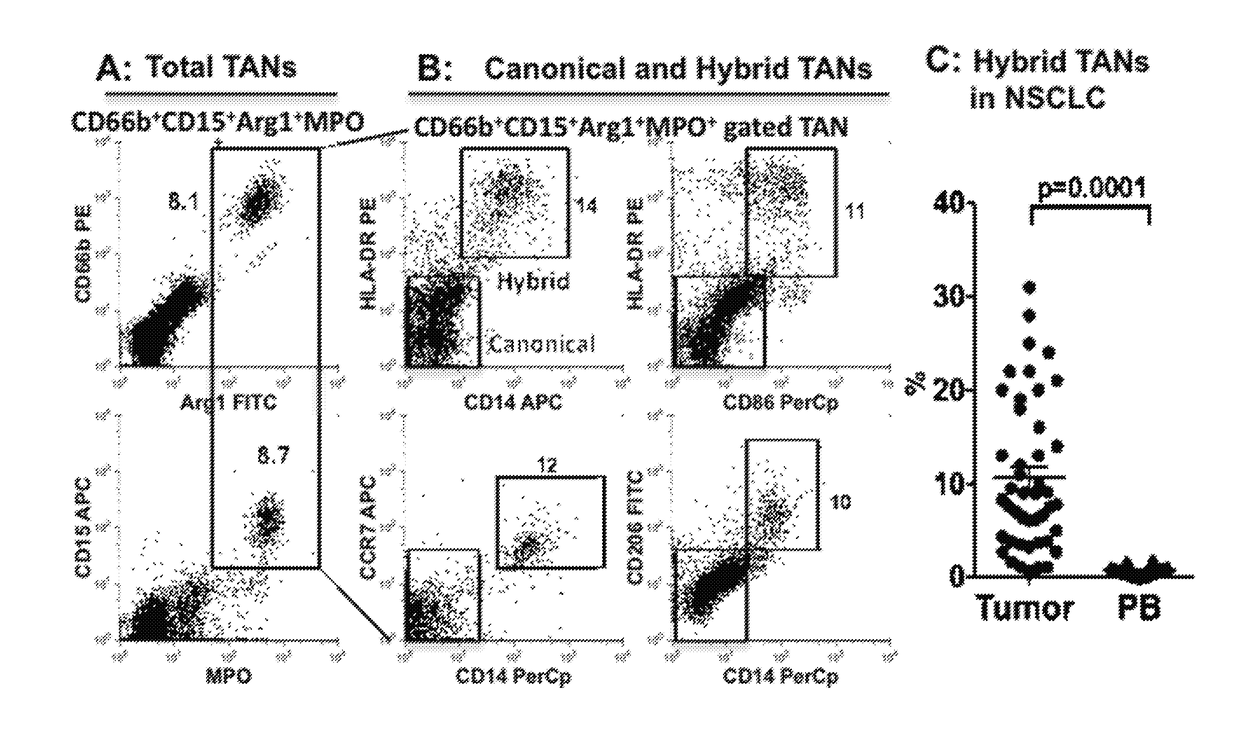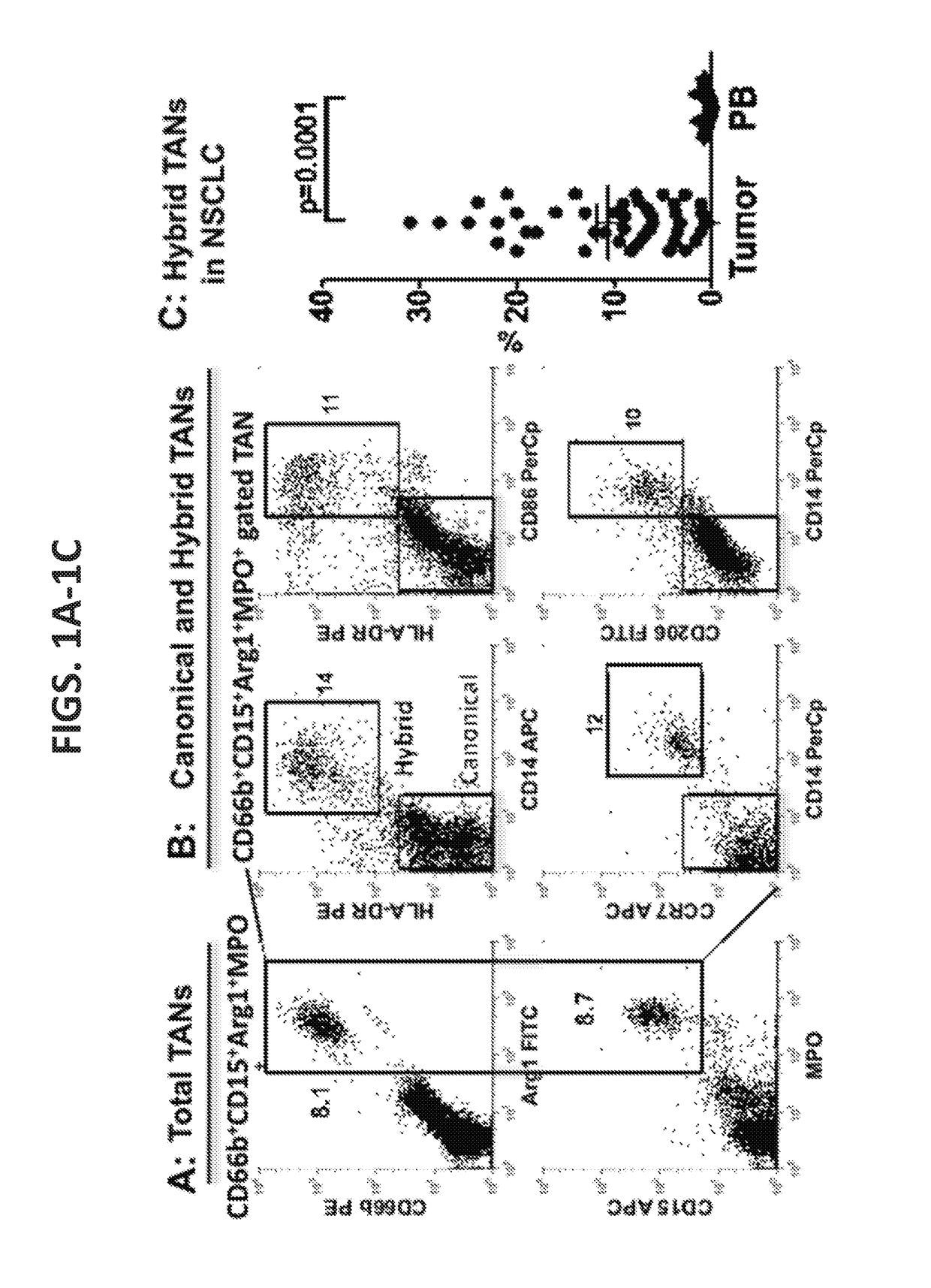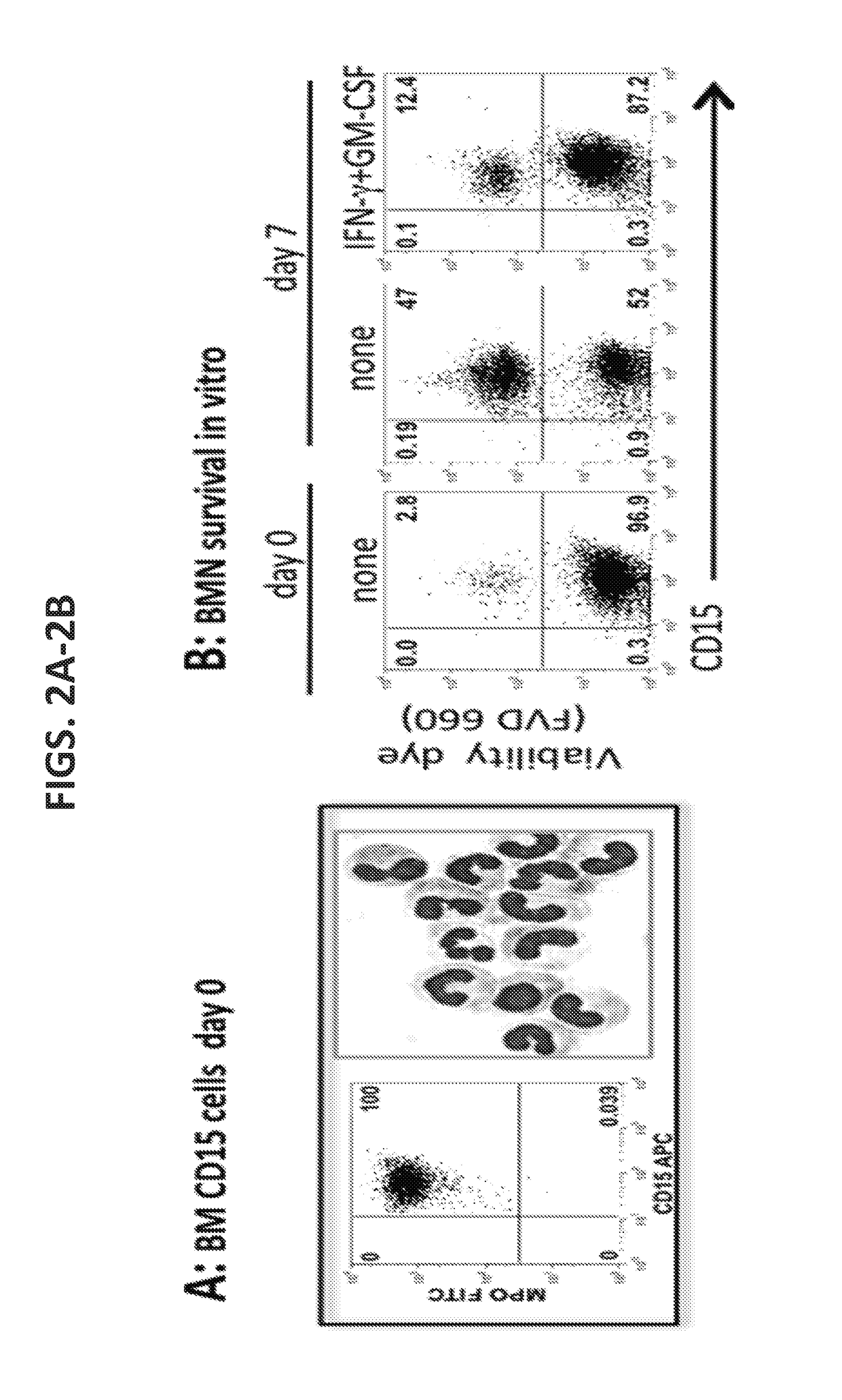Compositions and methods of enhancing Anti-tumor response using hybrid neutrophils
a technology of hybrid neutrophils and anti-tumor cells, which is applied in the field of compositions and methods of enhancing anti-tumor responses using hybrid neutrophils, can solve the problems of poor clinical efficacy of many therapeutic antibodies, limited therapeutic effects in trials, and the need for improvement of neutrophil-mediated ab therapy
- Summary
- Abstract
- Description
- Claims
- Application Information
AI Technical Summary
Benefits of technology
Problems solved by technology
Method used
Image
Examples
example 1
Identification of a Novel Subset of Tumor-Associated Neutrophils (TANs) Exhibiting the Composite Characteristics of Neutrophils and Antigen-Presenting Cells
[0202]Characterization of tumor-associated neutrophils (TANs) revealed that the majority of TANs in early stage of non-small cell lung cancer (NSCLC) express classic neutrophil markers CD11b+CD15hiCD66b+MPO+Arg1+ (“canonical TANs”, FIG. 1B, boxes in lower left corner). However, another subpopulation of TANs that displayed a combination of neutrophil (Arg1+MPO+CD66b+CD15+) and antigen-presenting cell (APC) (CD14+HLA-DR+CCR7−CD86+) markers was identified. This subpopulation of TANs is hereinafter referred to as “hybrid TANs” or “hybrid tumor-associated neutrophils.” (FIG. 1B, boxes in upper right corner). The frequency of these newly identified “hybrid” subset of TANs varied widely in tumor tissues of cancer patients (FIG. 1C).
example 2
Identification of Conditions in which the Immature Bone Marrow or Peripheral Blood Granulocytes Could be Differentiated into Hybrid Neutrophils in a Large Numbers
[0203]Using anti-CD15 magnetic beads, a highly enriched population of human bone marrow neutrophils (BMNs) was obtained from rib fragments that were removed from patients during routine lung cancer surgery. It was found that these BMNs exhibited a prolonged survival in vitro compared to peripheral blood neutrophils (PBNs). These CD15+ BMNs expressed the myeloid / granulocytic specific markers CD11b, CD66b, Arg1, myeloperoxidase (MPO) and were mostly “band”-like immature neutrophils (FIG. 2A; FIG. 2C). Importantly, unlike blood, about 40% of these BMNs could survive in cell culture for up to 1 week (FIG. 2B). Thus, human BMNs have a prolonged lifespan in vitro, providing large quantities of cells (>50 million cells) that can be used to differentiate immature neutrophils into the hybrid neutrophils.
[0204]Several ways to differe...
example 3
Hybrid CD14+HLA-DR+CD32hiCD64hi CD89hi Neutrophils Efficiently Phagocytose Bacteria and Mediate a High Level of Antibody Dependent Phagocytosis (ADP).
[0211]CD32hiCD64hi CD89hi hybrid neutrophils (which could be generated in large numbers from immature bone marrow or peripheral blood) are powerful effector cells that trigger sufficient removal of tumor cells or infectious pathogens through ADP or ADCC. The support for this claim comes from a comparative analysis of canonical and hybrid neutrophils that revealed that hybrid neutrophils are characterized by (1) augmented ability to phagocytose bacteria (FIG. 5A); (2) expression of very high levels of FcγRI (CD64), FcγRII (CD32) and FcαR (CD89) (FIG. 5D) (of note, the high affinity FcγRI / CD64 represents the most potent neutrophil FcγR for induction of ADCC (Valerius et al., Blood. 1993 Aug. 1; 82(3): 931-939)); (3) increased ability to mediate the high level of antibody-dependent phagocytosis (FIG. 5B); and (4) ability to mediate ADCC (...
PUM
| Property | Measurement | Unit |
|---|---|---|
| Fraction | aaaaa | aaaaa |
| Density | aaaaa | aaaaa |
| Density | aaaaa | aaaaa |
Abstract
Description
Claims
Application Information
 Login to View More
Login to View More - R&D
- Intellectual Property
- Life Sciences
- Materials
- Tech Scout
- Unparalleled Data Quality
- Higher Quality Content
- 60% Fewer Hallucinations
Browse by: Latest US Patents, China's latest patents, Technical Efficacy Thesaurus, Application Domain, Technology Topic, Popular Technical Reports.
© 2025 PatSnap. All rights reserved.Legal|Privacy policy|Modern Slavery Act Transparency Statement|Sitemap|About US| Contact US: help@patsnap.com



